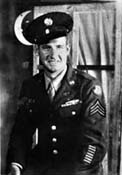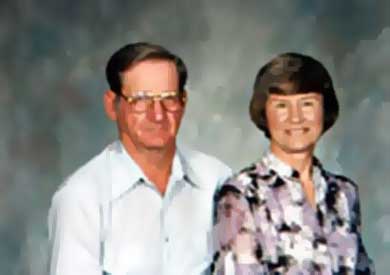
Established April 14, 1942
 |
American Ex-Prisoners of War
A not-for-profit, Congressionally-chartered veterans’ service organization advocating for former prisoners of war and their families.
Established April 14, 1942 |


Clyde F. McKee 1945
|

Clyde McKee and Rosetta, June 1980
|
||
| Last Name | First Name, Middle Init. | Nickname | |
| Street Add. | City | State | |
| Zip | Spouse | ||
| Conflict | Branch of Service | Unit: | |
| Theatre of Operation | Military Job | Where Captured | |
| Date Captured | Time Interned | Camps | |
| Date Liberated | Medals Received | Age at Capture | |
| After the War ... | |||
In 1939, Clyde, his brother Marion, and his Uncle Jim Pearce decided to go to Blythe, California to earn their fortune. On the way they picked cotton to purchase food and gasoline for Clyde's Model A Ford. When they arrived in Blythe they got jobs in the lettuce fields. Since this was not making them rich they decided to join the army and see the world. Marion was sent to the Panama Canal Zone where he died frompneumonia in 1942. Clyde was sent to the Philippines.
When the Japanese bombed Pearl Harbor on December 7, 1941, they also attacked Bataan and Corregidor. The men fought tenaciously until the last bullet was fired. No help came! Clyde was captured on Bataan, escaped briefly to Corregidor, and recaptured there. He and his fellow captives were marched to primitive stockades. Along the way they were not allowed to eat or drink. If a man broke line to get a drink he received a bayonet in the back.
Clyde was thrown on top of the dead and dying. Each was given a blanket filled with lice and scabies. There was no way to keep clean or any insecticides to rid themselves of the bugs. The men were moved from camp to camp: Bilibid Prison, Cabanatuan, Matsushima, and Honshu. Clyde was eventually taken to Japan where he was a POW for three and one-half years. There he worked in copper mines and shipyards. When the atomic bombs were dropped on Japan Clyde weighted less than 100 pounds, near death. If the bombs had not been dropped, Clyde and his fellow prisoners would have died.
Clyde was liberated in September, 1945 when the war was over. He said the only reason he survived his imprisonment was because he grew up poor and strong and knew how to do without. God was with him, and he never gave up hope. Somehow he knew we would win the war.
After the war, the ex-POWs boarded a US. Naval ship. On deck they were sprayed from head to foot with insecticide. Clyde said it was the best bath he had ever had. All the bugs were gone! At last he had a clean bunk and a good night's sleep. The kitchen was open to them 24 hours a day. He was headed home to see his family, whom he had not seen for six and one half years.
After Clyde returned home in October he met his future wife, Nola Rosetta Fleming in November, 1945. He wanted to get married right away. On December 25, 1945 they went to Oklahoma City and got married. Rosetta's sister, Lola Bernee Fleming and her boyfriend, Joy Travis Stevens, had a double wedding with Clyde and Rosetta.
Clyde and Rosetta tried farming and running a dairy for a few years. Then, in 1951, he went to work as a mechanic at Tinker Air Force Base in Oklahoma City. He stayed for 23 years.
Rosetta gave birth to a baby girl on August 23, 1947. They named her Shirley Ann after Shirley Temple. Another daughter was born October 30, 1953. They named her Bernita Gail after Rosetta's sister Bernee, and Gail Storm.
After Clyde retired from Tinker he bought some land and cattle. For the next 25 years he did what he enjoyed most, farming and tending to his cattle.
From the very beginning of his marriage, Clyde's health deteriorated. The lack of nourishment during his prison years caused his gums to recede. All his teeth abscessed and had to be pulled. His nerves gave him ulcers and heartburn and made it hard for him to associate with people in a group. He firing of artillery guns had impaired his hearing, which led him to withdrew even more from group gatherings.
Clyde was a sweet person who believed in Jesus as his savior. He was a good husband and father. He taught his family, by example, the difference between right and wrong.